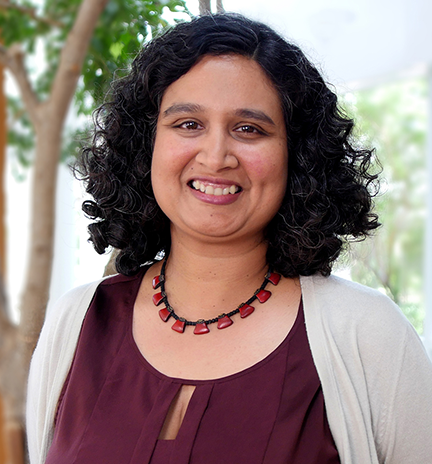About Kankshita Swaminathan

Email:
kswaminathan@hudsonalpha.org
Phone: (256) 327-9703
Location: 601 Genome Way, Huntsville, AL 35806
For Kankshita Swaminathan, PhD, plant research is all about what happens under the dirt. Swaminathan, PhD, is a faculty investigator at the HudsonAlpha Institute for Biotechnology where she works to sequence and understand complex plant genomes like silvergrass and sugarcane. Her goal is to make agriculture more sustainable, requiring less resources like water and minerals and improving farmers’ ability to produce the food, fuel and fiber that benefit us all.
“In order to provide genomic resources for studying these plants, we are working to improve our understanding of the Miscanthus genome to provide a foundation for other important perennials grasses,” Swaminathan says. “A lot of plant genomes, including those of many crops like sugarcane, are large and unwieldy. I enjoy the challenge of working with these difficult-to-study plants. We have a lot to learn from them that we can apply to other plants.”
Swaminathan uses genomics tools to understand the role of the rhizome – modified underground stems – in nutrient storage and reproduction in these grasses. This research focuses on the genetics behind how these perennial plants reproduce and how they capture and store nutrients to use year after year.
“We want to answer some questions about little-understood aspects of biology that are important for renewable energy crops,” Swaminathan says. “How does the rhizome contribute to overwintering, nutrient cycling and the spreading growth pattern, for instance?”
Some plants, like tomatoes and lilies, can self-pollinate, but the crops Swaminathan studies will not produce seeds without available pollen from another plant. The grasses have no way to produce seed on their own. Enter the rhizome. When plants shoot out an underground stem and create a new plant at the end of the stem, they propagate themselves. The genome of the “new” shoot breaking through the earth from the rhizome is a clone, identical to its parent plant.
The rhizomes on these plants also store nitrogen and other nutrients, allowing the grasses to recycle their resources over multiple growing seasons. Because of this ability to easily spread without pollination and store nutrients, the plants have a competitive edge in many landscapes, and they can easily colonize an area.
Swaminathan came to HudsonAlpha in 2016 from the Energy Biosciences Institute at the University of Illinois in Urbana where she was a research specialist in feedstock genomics. She earned her PhD from Dartmouth in 2005.
2005 PhD in Biology, Dartmouth College, Hanover, NH
1996 MSc in Life Sciences, Pondicherry University, Puducherry, India
1994 BSc in Chemistry, Botany and Zoology, St. Joseph’s College of Arts and Science, Bangalore, India
2016 Faculty Investigator, HudsonAlpha Institute for Biotechnology, Huntsville, Ala.
2008-2016 Research Specialist in Feedstock Genomics, University of Illinois
2005-2008 Postdoctoral Research Associate, University of Illinois
